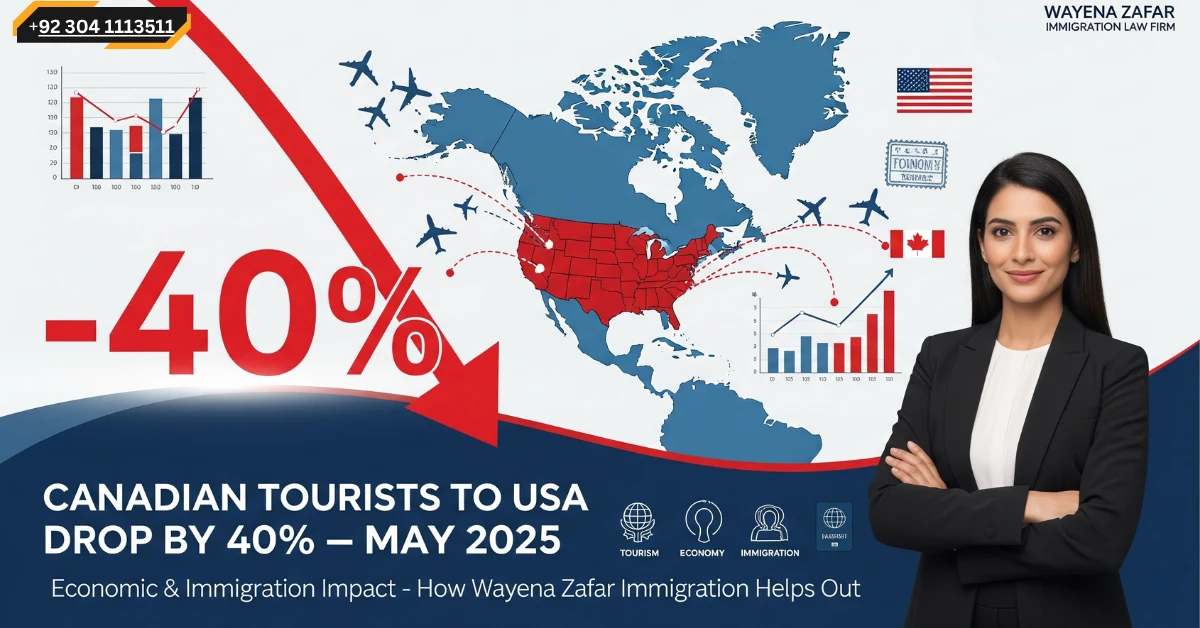A Shocking Drop in Cross-Border Travel
In a dramatic shift this May, Canadian tourists to USA dropped by nearly 40%, alarming tourism analysts and immigration experts alike. Recent May 2025 travel statistics illustrate an astounding 38% decrease in Canadian road travel to the U.S., while air travel from Canada declined 24% year over year.
This marks the fifth straight month of lower inbound travel from Canada, pointing to a long-term trend influenced by multiple factors—not just seasonality.
According to Wayena Zafar, CEO of Wayena Zafar Immigration Law Firm, “These declines mirror our clients’ sentiments—people are increasingly uncertain about cross-border travel safety and policy clarity.”
Reasons Behind the Decline of Tourist Visas
The plunge in Canadian visitors isn’t just a fluke. It’s rooted in several major reasons:
| Reason | Details |
| Political Tensions | Trade disputes and controversial remarks sparked a travel boycott |
| Economic Uncertainty | Weaker CAD and inflation are discouraging leisure trips |
| Travel Advisory & Sentiment | Over 75% of Canadians reconsidered U.S. trips due to negative sentiment |
| Rise in Domestic Travel | Canadians choosing to spend within their borders |

Immigration strategist at Wayena Zafar firm, Mr. Junaid, adds, “When public sentiment turns negative, especially from a close ally like Canada, the effects ripple through all visa and travel segments.”
Deep Economic Fallout for the U.S. Tourism Sector
The U.S. tourism industry’s loss could be massive. A 10% dip in Canadian visitors may result in $2.1 billion in lost revenue and 140,000 hospitality job losses (Source: US Travel Org). But some experts warn the actual losses could be 3x or 4x higher, putting key tourism hotspots like New York, Florida, and California at risk.
| Metric | Estimated Impact |
| Drop in Canadian Travel (May) | Nearly 40% |
| Potential Revenue Loss | $2.1B to $6.3B |
| Hospitality Jobs at Risk | 140,000+ |
“The economic domino effect is real. When tourism dries up, small businesses—especially those run by diaspora communities—are the first to feel the heat,” notes Ms. Binish, Economics Analyst at Wayena Zafar.
Political Factors Behind the Canadian Boycott
This decline is also fueled by politics. After controversial “51st state” remarks and tariff threats, tensions between leaders intensified. This led to a sweeping U.S.–Canada travel boycott, with:
- 75% of Canadians are changing their travel plans
- 56% canceling trips altogether
These stats reflect a significant shift in traveler psychology and trust.
Surge in Domestic Travel Within Canada
While the U.S. loses tourists, Canadian domestic tourism in 2025 is booming. According to current surveys:
- 55% of Canadians plan local summer vacations (up from 47% in 2024)
- Only 10% plan to visit the U.S.
- 77% prefer staying within Canada
The trend is a win for Canada’s local tourism but a concern for U.S. operators.

“We’re advising clients to look at intra-national destinations more favorably for now. Canada’s tourism and economy are benefiting from this pivot,” says Immigration Advisor Afshan.
Global Impact on U.S. Tourism from Other Countries
The decline isn’t limited to Canada. A broader drop in international visitors to the U.S. is underway. Forecasts suggest:
- A 9% drop in global arrivals
- $8.5 billion in spending loss
- S. travel recovery still lags behind pre-2019 levels
With stiff competition from Europe and Asia, the U.S. risks losing long-term tourist loyalty.
“The gap is widening. Travelers are now more inclined toward stable destinations with transparent entry rules,” observes CEO Wayena Zafar.
Proposed Budget Cuts to Brand USA
The situation may worsen. Proposed Brand USA budget cuts could slash funding from $100 million to just $20 million, according to an authentic tourist review source. Experts warn this will damage international U.S. destination marketing efforts, making recovery even harder.
“Marketing plays a critical role. Without visibility and assurance, tourists won’t return,” comments Brand Strategy Consultant at Wayena Zafar’s firm.
Loss of Export Revenue from Tourism
Tourism is a top export for the U.S. Each 1% drop in visitor spending = $1.8B loss. If current trends hold, tourism export revenue may drop by more than $21 billion in 2025.
“This is not just tourism loss—it’s export shrinkage,” notes Economic Policy Analyst at Wayena Zafar.
Indirect Impact on U.S. Immigration Image
This travel downturn affects more than tourism—it’s damaging the U.S. immigration reputation. Negative sentiment and travel bans deter skilled immigrants, students, and entrepreneurs, influencing visa perception USA and global opinion on U.S. travel policies.
“We’re getting more consultations from skilled professionals who’ve completely shifted focus away from the U.S.,” adds CEO Wayena Zafar.
Insight from Wayena Zafar, Immigration Law Firm
Wayena Zafar, CEO of the Lahore-based Wayena Zafar Immigration Law Firm, states: “We’ve observed a distinct shift. Applicants now lean toward Canada and the UK. The U.S. is seen as less stable due to inconsistent immigration rules and unclear travel signals.”
She adds that both families and skilled workers are looking for transparent, welcoming policies—traits more often found in Canada and the UK today.
Implications for Pakistani Travelers and the Diaspora
The decline impacts the Pakistani diaspora in the U.S. and Canada. Many face canceled cross-border Pakistani travel plans, delays in visa processing, and general uncertainty.
- Family reunions are being postponed
- Business trips and conferences are down
- Pakistani tourists are redirecting their travel toward Europe or Asia
“Many families with dual residencies now prefer meeting in third-party countries like Turkey or Japan,” says a senior advisor at Wayena Zafar.
Changing Migration Preferences Among Pakistanis
Recent studies show rising Pakistani immigration trends favoring Canada, the UK, and Australia.
Why?
- Canada vs. USA for Pakistanis: Canada offers more work-friendly visa options
- Growing trust in the UK and Australian education systems
- Unpredictability in U.S. visa approvals deters students and workers
This has resulted in a 30–35% increase in Canadian and UK study permit applications from Pakistan in the last two years.
“Education and work migration are increasingly about reliability. U.S. doesn’t score well here,” says CEO Wayena Zafar.
Economic Impact on Pakistani-American Businesses
Pakistani-owned businesses in the USA, especially in travel, food, and retail, are directly affected.
Many are experiencing:
- Reduced footfall from tourists
- Slowed revenue in ethnic hubs like New York and Houston
- Layoffs and tighter budgets for small business owners
This is creating a small business tourism crisis that hits diaspora communities hardest.
Canada’s Progressive Work Permit Policies
While the U.S. faces setbacks, Canada is attracting global talent by streamlining its immigration policies. Recent updates allow job-switching under interim authorization, removing the need to wait for complete approvals. Here is the latest Canadian work permit policy.
What Foreign Workers Should Know About This Policy
- Apply before starting the new job
- Keep all documentation (receipts, confirmation emails)
- Understand how “maintained status” applies
Such reforms boost trust and flexibility—two qualities that foreign workers prioritize.
“These steps by Canada reflect modern labor needs. More countries will follow,” explains HR & Migration Analyst Rukhshanda.
Services by Wayena Zafar Immigration Law Firm
We specialize in strategic global migration, helping individuals and families move confidently.
Our services include:
- Canada: PR through investment, study visa (with full annual fee paid), work permits
- UK: Tier 2 (Skilled Worker) and Tier 5 (Youth Mobility) Visas
- USA: H1B Visa, student pathways (OPT, CPT)
- Malta & Albania: Legal work permit solutions
- Europe: Permanent residency in Portugal, Grenada, Dominica
- Georgia, Canada, USA: Study abroad services
- Global: Citizenship & residency programs for investors

“We don’t just process visas. We provide strategic immigration pathways that match your goals,” says CEO Wayena Zafar.
Conclusion: A Wake-Up Call for the U.S.
The sharp decline in Canadian tourists to the USA is a reflection of broader discontent, politically, socially, and economically. If left unaddressed, this trend could severely affect the U.S. travel economy, its global immigration image, and its position as a top destination for travelers and skilled migrants alike.
But for those seeking clearer paths, Canada, the UK, and Europe are leading—and with partners like Wayena Zafar Immigration Law Firm, success is just a strategy away.
